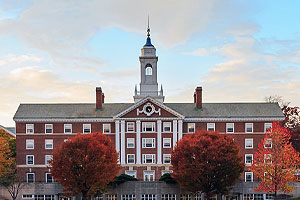
This question appears absurd—roughly akin to asking if the sky can be underground or if a rock can be a book. Every object has a nature. It is in the nature of the sky to be above ground and for a book to be bound up pieces of paper. To argue anything else is ridiculous.
Yet, Harvard University recently selected a self-professed atheist to be not only a chaplain but the president of its cadre of chaplains.
His name is Greg Epstein. In addition to his other efforts, Mr. Epstein is the author of Good Without God: What a Billion Nonreligious People DO Believe. He sums us his lack of faith, saying that “We don’t look to a god for answers. We are each other’s answers.”
Mr. Epstein has been the “humanist chaplain” at Harvard since 2005. The position was created in 1974.
Architect of an Illusion
The obvious question is, “How is it possible for an atheist to be a chaplain?” Indeed, the definition of a chaplain is “a clergyman officially attached to a branch of the military, to an institution, or to a family or court.”
Interestingly, Mr. Epstein does claim to be a clergyman. His biography on Harvard’s website states, “In 2005, Greg received ordination as a Humanist Rabbi from the International Institute for Secular Humanistic Judaism.” Yet, it is unclear how he can be ordained unless he believes in the supernatural. That contradicts the definition of ordain, which is “to invest officially (as by the laying on of hands) with ministerial or priestly authority.”
Help Remove Jesus Bath Mat on Amazon
No doubt, Mr. Epstein believes that he ministers to Harvard’s nonreligious students. However, a more accurate description of his role would be a psychologist, community organizer or mediator. New York Post quotes one such student. “Greg’s leadership isn’t about theology. It’s about cooperation between people of different faiths and bringing together people who wouldn’t normally consider themselves religious.”
Is Humanism a Religion?
Merriam-Webster defines humanism as “a doctrine, attitude, or way of life centered on human interests or values, especially: a philosophy that usually rejects supernaturalism and stresses an individual’s dignity and worth and capacity for self-realization through reason: SECULAR HUMANISM.” (Emphases in the original.)
The Supreme Court of the United States backed into a definition of secular humanism as a religion in Torasco v. Watkins (1961). The court said, “neither a State nor the Federal Government can… aid those religions based on a belief in the existence of God as against those religions founded on different beliefs.” Then it added a footnote. “Among religions in this country which do not teach what would generally be considered a belief in the existence of God are Buddhism, Taoism, Ethical Culture, Secular Humanism and others.” (Emphasis added.)
However, not all humanist thinkers agree. A former regional director for the Council for Secular Humanism, Austin Cline, wrote that humanism and religion are mutually exclusive.
Satanic Christ Porn-blasphemy at Walmart — Sign Petition
“The most commonly cited “essence” of religion involves supernatural beliefs, whether supernatural beings, supernatural powers, or simply supernatural realms. Because they also define humanism as fundamentally naturalistic, the conclusion follows that humanism itself cannot be religious—it would be a contradiction for a naturalistic philosophy to include the belief in supernatural beings.”
The Pride Underlying Humanism
Indeed, humanism and religion are as distinct from each other as Heaven is from Hell, literally. The root of humanism is found in the greatest rebellion—when Satan pronounced to God “non serviam” (I will not serve). Unlike Satan, who certainly knows that God exists, the humanist refuses to serve out of a mistaken and proud conviction that there is no force in the universe higher than humanity. Even so, the disobedience is just as real.
The Catholic Encyclopedia defines humanism in the context of antiquity. “Humanism is the name given to the intellectual, literary, and scientific movement of the fourteenth to the sixteenth centuries, a movement which aimed at basing every branch of learning on the literature and culture of classical antiquity. Believing that a classical training alone could form a perfect man, the Humanists so called themselves in opposition to the Scholastics [the intellectual movement led by Saint Thomas Aquinas], and adopted the term humaniora (the humanities) as signifying the scholarship of the ancients.”
How Panera’s Socialist Bread Ruined Company
Modern humanists extend that definition to a belief that humanity is already perfect, at least those humans who have abandoned religion. That is what Mr. Epstein implies when he says, “We are each other’s answers.”
Mr. Epstein is not leading his adherents to answers. He leads them to perdition since his vision prevents human creatures from paying due reverence to the Creator.
The Catholic Attitude
Contrast this attitude with that taught for over a century to American Catholic children. Perhaps the most famous question and answer in the Baltimore Catechism is in Lesson One:
Q. Why did God make you?
A. God made me to know him, to love Him, and to serve Him in this world, and to be happy with Him forever in Heaven.
What Does Saint Thomas Aquinas Say About Marriage?
Perhaps nowhere else is the duty of every Christian—and the eternal reward for fulfilling that duty—spelled out more beautifully and more simply. Any child can understand the words, and yet fulfilling them is the work of a lifetime.
The same child could answer the original question in all simplicity and innocence: Can an atheist be a chaplain?
No.
Photo Credit: ©Jannis Werner — stock.adobe.com


